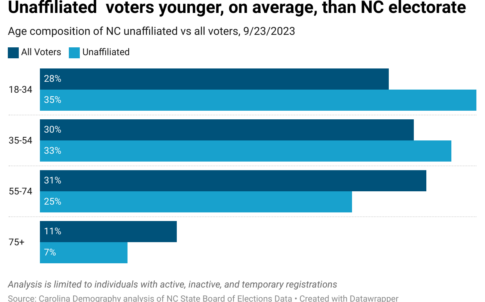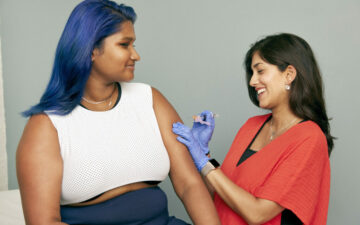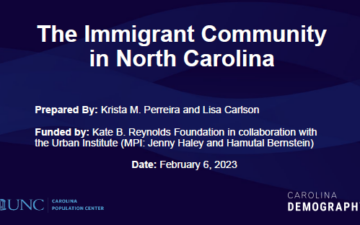Who are North Carolina’s Unaffiliated Voters? 2023 Update

This is part of our series looking at NC’s registered voters. Other stories include an in-depth look at NC’s Republican voters and an in-depth look at NC’s Democrat voters. This is an update of our story from October 2022.
As of September 23rd, 2023, North Carolina had 7.3 million registered voters. Of these, 2.6 million or 36.3% were registered unaffiliated. This post examines the characteristics of NC’s unaffiliated voters.
Younger voters are the most likely to register as unaffiliated. Forty-six percent of voters ages 18-34 are registered unaffiliated compared to 39% of voters ages 35-54, 29% of voters ages 55-74, and 25% of voters 75 and older. As a result, younger adults, especially those ages 18-34, comprise a larger share of unaffiliated voters than the overall electorate.
Reflecting this age structure, 5% of North Carolina's unaffiliated voters first registered to vote in the state before 1990; 8% registered in the 1990s; 15% in the 2000s; and 72% in 2010 or later.
Compared to the state population overall, unaffiliated voters are more likely to identify as white (66% vs. 64%). Asian (2.3%) and Hispanic (5%) voters also are more likely amongst unaffiliated voters, in comparison to the electorate as a whole, while black voters (11%) are less common.
Voters who did not report a race or ethnic identification were the most likely to register as unaffiliated (53%), followed by Asian (53%), other race (47%), Hispanic (46%), multiracial (44%), White (37%), and American Indian (36%) voters. Black voters were the least likely to register as unaffiliated (22%).
Excluding North Carolina-born voters, Northeastern-born voters are the most likely to be registered as unaffiliated and account for over 14% of all unaffiliated voters. Fifty percent of voters born in both Rhode Island and Massachusetts and 49% of New Hampshire-born voters are registered unaffiliated, followed by Vermont (47%). Aside from the Northeast, just under 14% of unaffiliated voters hail from a southern state besides North Carolina, followed by 8% from the Midwest, and 4% from the West. Over a fifth of all unaffiliated voters don’t report their place of birth (22%).
Just over 875,000 unaffiliated voters — 33% of the state’s unaffiliated voter population—were born in North Carolina. New York (149K), another country (114K), Virginia (89K), New Jersey (61K), and Florida (61K) were the next most common birthplaces outside of North Carolina.
Across North Carolina’s 100 counties, the county share of unaffiliated voters ranges from about one in five voters to nearly one in every two voters. Unlike patterns of Democrat and Republican registrations, there are less clear regional patterns in unaffiliated registrations. The top 10 counties for unaffiliated voters include:
The top counties for unaffiliated voters include one of the most populous counties (Wake) and one of the least populous counties (Camden) in the state.
Counties with the lowest rates of unaffiliated voter registrations were in the northeast. Edgecombe County (16%) had the fewest voters registered unaffiliated, followed by Warren (20%), and Hertford (21%).
Note: Analysis presented is of the 9/23/2023 voter registration file from NC’s State Board of Elections. Analysis is limited to individuals who are active, inactive, or temporary registered voters. Voters with a reported birth age of 116 years or older were excluded from the age analysis. Thus, those born before 1909 were excluded. Likewise, voters with registration dates prior to 1930 were excluded from the registration date analysis.
Need help understanding population change and its impacts on your community or business? Carolina Demography offers demographic research tailored to your needs.
Contact us today for a free initial consultation.
Contact UsCategories: Elections & Voting

The Center for Women’s Health Research (CWHR) at the University of North Carolina School of Medicine released the 12th edition of our North Carolina Women’s Health Report Card on May 9, 2022. This document is a progress report on the…

Dr. Krista Perreira is a health economist who studies disparities in health, education, and economic well-being. In collaboration with the Urban Institute, she recently co-led a study funded by the Kate B. Reynolds Foundation to study barriers to access to…

Our material helped the NC Local News Lab Fund better understand and then prioritize their funding to better serve existing and future grant recipients in North Carolina. The North Carolina Local News Lab Fund was established in 2017 to strengthen…
Your support is critical to our mission of measuring, understanding, and predicting population change and its impact. Donate to Carolina Demography today.